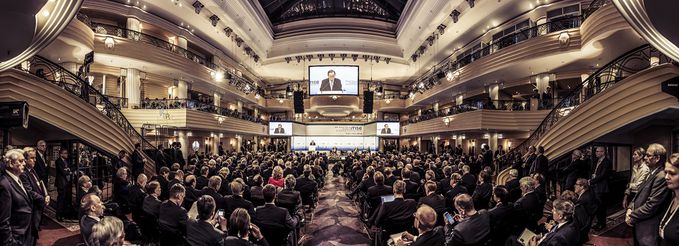In Munich this weekend, the world’s top international security experts were attending the 53rd Munich Security Conference with more than 500 leaders debating the world’s international crisis’ and shaping the policy decisions which will affect the future of global civilization.
On Friday, Senator John McCain addressed the conference and delivered some sobering warnings, stating, “My friends: In the four decades I have attended this conference, I cannot recall a year where its purpose was more necessary or more important.”
He went on to say, “From the ashes of the most awful calamity in human history was born what we call the West—a new, and different, and better kind of world order…one based on universal values, rule of law, open commerce, and respect for national sovereignty and independence.”
Speaking on the current state of the world, McCain stated the founders of the MSC would be “alarmed.” He states, “[t]hey would be alarmed by an increasing turn away from universal values and toward old ties of blood, and race, and sectarianism. They would be alarmed by the growing inability, and even unwillingness, to separate truth from lies. They would be alarmed that more and more of our fellow citizens seem to be flirting with authoritarianism and romanticizing it as our moral equivalent.”
Though never mentioning President Trump by name, his speech clearly is an indictment of the policies and the increasingly controversial rhetoric of his administration. McCain’s speech isn’t the first time Trump was the center of the conversation during the weekend conference as Europe struggles with how to predict his presidency.
Conference Chairman, Wolfgang Ischinger, wrote an op-ed for global commentary outlet Project Syndicate. In his article, Ischinger warns that Europe must “engage with the US administration as closely as possible,” despite “the US under Trump [being] an unattractive ally for Europe.” According to Ischinger, Europe has little choice.
“In the short and medium term, Europeans cannot do without the US security guarantee. As a result, we must work to convince the new administration of the importance of a united and peaceful Europe.” Ischinger closes his op-ed with some advice for European leadership, stating, “Instead of waiting in fear of the next Trump tweet, we Europeans should lay the foundations for a Europe that is strong, capable of taking action, and committed to Western values. From this position, we can assert our key interests vis-à-vis the US with confidence. That is the best response Europe can give.”
Clearly Trump’s administration has shaken things up on the world stage just as he said he would. However, whether this shake up is a step forward or a stumble backward is unclear and this uncertainty is what is graying the hairs of the world’s security experts.
On Saturday, Vice President Pence took the stage to bring some assurances after the resignation of Michael Flynn furrowed the brows of many US allies. Pence said, “on behalf of President Trump, I bring you this assurance: the United States of America strongly supports NATO and will be unwavering in our commitment to this transatlantic alliance.”
Pence continued offering a promise from the President that the US “will stand with Europe today and every day, because we are bound together by the same noble ideals – freedom, democracy, justice and the rule of law,” and tried to quell the continued Russian rumors by assuring that “the US will continue to hold Russia accountable.”
Meanwhile, Turkey’s top diplomat has urged for more US special operations forces to help combat the continued ISIS threat in Syria. Mevlut Cavusoglu spoke on the closing day of the conference proposing “the United States put special operations forces on the ground to support local forces,” in Syria. Cavusoglu went on to ask more support from NATO to help them stabilize Turkey’s southern border which has seen a flood of refugees fleeing the conflicts in both Iraq and Syria. Cavusoglu’s comments come as Trump considers military options submitted by the top brass at the Pentagon to the Syrian dilemma.
Already have an account? Sign In
Two ways to continue to read this article.
Subscribe
$1.99
every 4 weeks
- Unlimited access to all articles
- Support independent journalism
- Ad-free reading experience
Subscribe Now
Recurring Monthly. Cancel Anytime.










COMMENTS